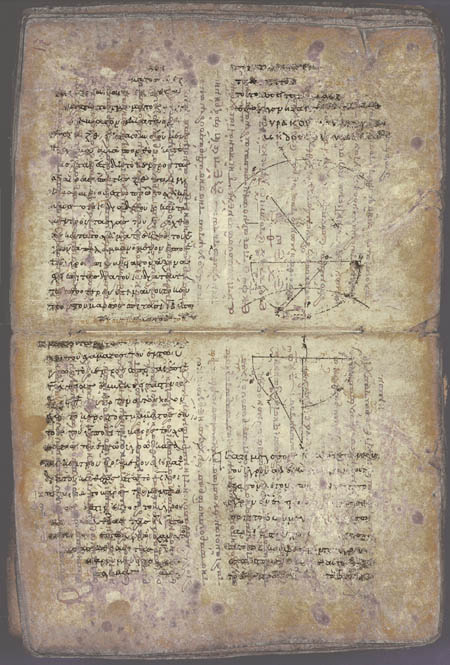about a Palimpsest?
NEW YORK (from news sources) - The Greek Orthodox Church, which claims ownership of a 10th century copy of a manuscript by mathematical genius Archimedes, lost a last-minute court battle Wednesday to stop an auction of the work at Christie's.
U.S. District Judge Kimba Wood refused to block the auction scheduled for 2 p.m. EST (1900 GMT) Thursday in Manhattan. After holding an emergency hearing in the early evening, the judge ruled that Christie's had the right to auction the work on behalf of a French family that has had it for some 75 years.
Wood agreed with arguments by Christie's that French law should apply in the case. Under those laws, anyone who holds a work for more than 30 years becomes its rightful owner.
The Orthodox Patriarchate of Jerusalem sued Christie's earlier Wednesday in an effort to stop the auction. The religious entity alleged that the 174 pages of text were stolen. But Christie's argued that the current owners of the work were descendants of a Frenchman who legally bought the volume in the 1920s.
Simos Dimas, a lawyer representing the religious entity, told Reuters his client would not take any other action to block the salebut would pursue the lawsuit in order to recover the work from the successful bidder.
The text is believed to be the oldest and most authentic copy of Archimedes' major works to survive, and contains transcriptions of the Greek mathematician's writing on geometry and physics. Christie's expects the sale to bring about $1 million. Archimedes lived from 287-212 B.C.
The volume being sold is a palimpsest, which is a manuscript in which pages have been written on twice. When writing materials were scarce, an original text could be washed off so the parchment could be reused. The upper layer of writing on the document to be auctioned contains instructions for religious rites. But underneath are versions of Archimedes' most celebrated Greek texts, ``Method of Mechanical Theorems'' and ``On Floating Bodies.'' In the Middle Ages, the work was owned by a monastery in Palestine whose collection was incorporated into the Greek Patriarchate library in Jerusalem in the 19th century. It was later transferred to a monastery in Constantinople, now Istanbul. The work was taken to Athens when the monastery's library was broken up after World War I.

October 28, 1998
Christie's is convinced its consignor has a legal right to sell it, Lytsman said. Dr. Hope Mayo, Christie's consultant for manuscripts, said the work has been owned by the same French family for 70 years, but she would not reveal the seller's identity. Archimedes lived in the ancient Greek city of Syracuse in Sicily and was killed in 212 B.C. by the Romans during the Second Punic Wars.
He is credited with many engineering developments, including catapults, pulley hoists, machines for pumping water and grappling irons used to tip ships over.
Legend has it that he leaped naked from a bathtub and ran through the streets shouting "Eureka!" ("I have found it!") after solving a problem. Scholars generally agree with many Greeks that the text should be in the public domain.
"It definitely ought to be in some public institution and not locked up in someone's family
archive," said Marshall Clagett, an Archimedes expert and professor emeritus of history at the Institute for Advanced Study in Princeton, New Jersey. "It's just too important a work for that."